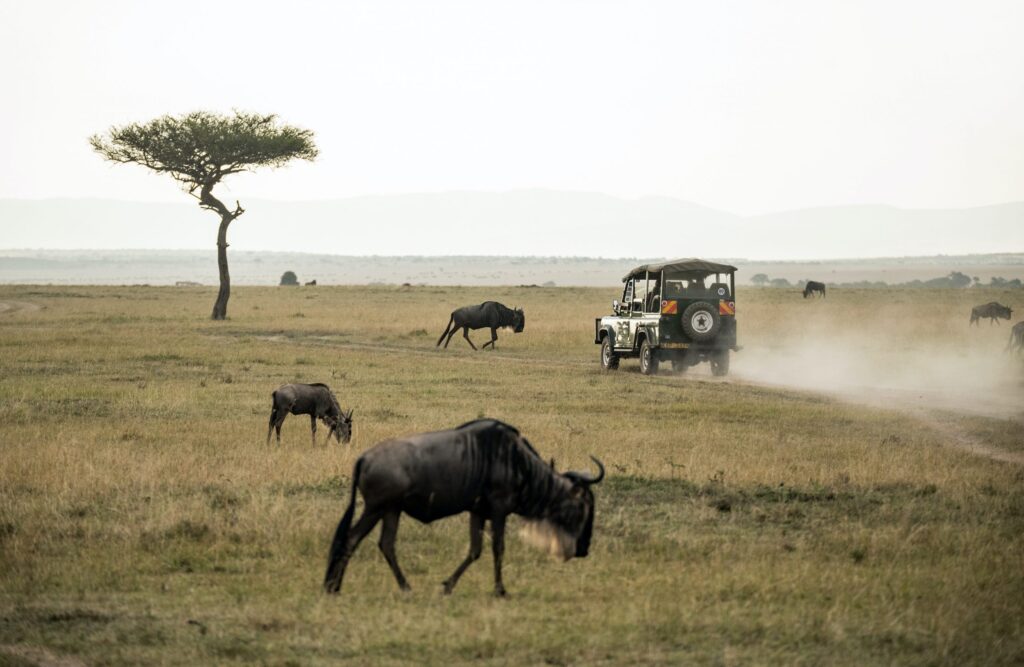Planning a safari adventure is an exhilarating prospect, offering a unique blend of wildlife immersion, cultural encounters, and unforgettable landscapes. However, meticulous preparation is essential to ensure your African safari is as magical and stress-free as possible. Here’s a comprehensive guide to planning the perfect African wildlife experience, balancing expert insights with practical advice.
1. Pick the Right Place to Go
Africa has many countries where you can go on safari, and each offers a unique experience. For example, Kenya and Tanzania are famous for the Great Migration in the Serengeti and Maasai Mara. South Africa’s Kruger National Park and Botswana’s Okavango Delta also offer incredible wildlife viewing. Start by researching these locations to find which one fits your dream safari【8】【9】.
2. Choose the Best Time
The best time to go on safari depends on the country and what animals you want to see. The dry season, from June to September, is great for spotting wildlife because animals gather near water. However, visiting in the shoulder season, like May or October, might offer fewer crowds and unique experiences【8】【9】. Make sure to book early, especially if you plan to see the Great Migration.
3. Plan Your Budget
Safaris can be expensive, but there are options for every budget. If you’re looking for something affordable, group safaris or tented camps might be best. If you prefer luxury, private safaris and high-end lodges offer a more exclusive experience. Don’t forget to budget for extras like park fees, activities, and travel costs【8】.
4. Create a Balanced Itinerary
Most people spend about 7 to 10 days on safari. This allows you to visit multiple areas and see a wide variety of wildlife. You might want to explore both the savannahs of Kenya and the wetlands of Botswana to experience different environments. A mix of adventure and relaxation will help you enjoy your trip without feeling rushed【9】.
5. Choose the Right Accommodation
Safari accommodations range from basic lodges to luxury tented camps. Some places are closer to wildlife, giving you better chances to see animals. Mobile camps move with the animals, which is ideal for tracking migrations. Be sure to pick an eco-friendly option to help protect the environment【9】.

6. Add Special Activities
Beyond game drives, you can enhance your safari by adding special activities like hot air balloon rides, bush walks, or even night safaris. These experiences provide a different view of Africa’s wildlife. You can also visit conservation areas or local communities to learn more about the culture and wildlife protection efforts【8】【9】.
7. Pack Smartly
When packing, focus on comfort. Bring neutral-colored clothes for blending in, layers for the changing temperatures, and essentials like sunscreen and insect repellent. You’ll also need a good pair of binoculars to spot animals from a distance【7】.
Final Thoughts
An African safari offers the adventure of a lifetime. With the right planning, you can make sure it’s an unforgettable experience. By picking the right destination, timing your trip well, and organizing your budget and activities, you can enjoy everything Africa has to offer, from its stunning landscapes to its incredible wildlife.
Here are some frequently asked questions (FAQs) about planning an African safari:
1. What is the best time to go on an African safari?
The best time for a safari depends on the destination and what you want to see. For most regions, the dry season (June to September) is ideal for spotting wildlife as animals gather around waterholes. However, shoulder seasons like May or October can offer fewer tourists and special wildlife events, such as animal migrations【8】【9】.
2. How long should my safari last?
Most experts recommend 7 to 10 days for a safari. This allows you to explore different regions and see a variety of wildlife without feeling rushed. Some prefer a two-week trip, especially if visiting multiple countries【8】【9】.
3. What is the best country for a first-time safari?
For first-timers, Kenya and South Africa are popular choices because they offer well-developed tourism infrastructures, easy access to wildlife, and a wide range of accommodation options. Both countries are home to famous national parks like Maasai Mara and Kruger National Park【9】.
4. What type of accommodations are available on safari?
You can choose from basic lodges, luxury tented camps, and mobile camps. Budget options include simpler lodges, while high-end travelers may prefer private lodges with all-inclusive services. The right choice depends on your budget and the experience you want【9】.
5. Is it safe to go on safari in Africa?
Yes, it’s generally safe, especially if you go with a reputable tour operator. Guides are trained to handle wildlife encounters, and most camps and lodges follow strict safety protocols. However, it’s important to follow instructions and be aware of your surroundings【7】【9】.
6. What should I pack for a safari?
Pack neutral-colored clothing, comfortable shoes, and layers for varying temperatures. Essentials include a hat, sunscreen, insect repellent, and a good camera with binoculars for wildlife viewing【8】.
7. Can I go on a safari with children?
Yes, many safari lodges and operators are family-friendly and offer activities designed for kids. Some even provide educational programs for children. However, it’s essential to check age restrictions for certain parks or activities【7】.
8. How much does a safari cost?
The cost of a safari can vary greatly. Budget safaris can cost around $150 per day, while luxury safaris can go up to $1,000 or more per day. Additional costs include park fees, transportation, and optional activities【9】.
9. Do I need to get any vaccinations before traveling to Africa?
Yes, depending on the region, you may need vaccinations for diseases like yellow fever. It’s also advisable to take anti-malarial medication if you’re visiting areas where malaria is common. Check with your doctor well before your trip【7】.
10. Do I need a visa for an African safari?
Most African countries require a tourist visa for entry, which can often be obtained online or on arrival. Make sure to check the visa requirements for the specific country you plan to visit【7】【9】.






